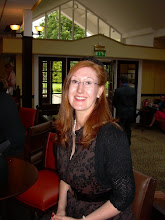 I'm reading the poems of Anna Akhmatova (in translation; I'm learning Russian, but not that quickly!) I don't know much about Russian poetry (other than a little bit about Formalist criticism) so am trying to learn, and was very interested by the introduction which mentions that she was part of the Acemist movement, or Guild of Poets, formed in Russia in 1910. Apparently the Acemists had had enough of Symbolism, and wanted concrete images, bringing poets and poetry back to earth, as it were. Their aim was "direct expression through images", as their manifesto, The Morning of Acmeism suggests.
I'm reading the poems of Anna Akhmatova (in translation; I'm learning Russian, but not that quickly!) I don't know much about Russian poetry (other than a little bit about Formalist criticism) so am trying to learn, and was very interested by the introduction which mentions that she was part of the Acemist movement, or Guild of Poets, formed in Russia in 1910. Apparently the Acemists had had enough of Symbolism, and wanted concrete images, bringing poets and poetry back to earth, as it were. Their aim was "direct expression through images", as their manifesto, The Morning of Acmeism suggests.Akhmatova's poetry is enthralling - unlike anything I've ever read. I'm sure it's partly due to translation issues (and I am planning to get my Russian good enough to read it in the original) but the poems seem to have a flavour of haiku, not just in their preoccupation with the natural world but also their conciseness and lack of high-flown sentiment. Acmeism seems to me to be a readily identifiable movement through this. (If "acme" means "the highest point", I suppose their intention was that this would be the peak of Russian poetry).
The poem 'The Guest' (1914) is both terrifying (in a very Gothic way) and quite concrete in its images; amazing how Akhmatova creates a sinister atmosphere without symbol or surface emotion. Apparently she was attacked by the Soviet state who claimed that the "mists of loneliness and hopelessness [were] alien to Soviet literature". Yet she created these mists from the materials of the world around her, like a sorcerer conjuring up a genie from a lantern. Both this and the haiku-nature of her poetry is illustrated in 'Parting', one of her many poems about love and loss:
Evening, sloping
path before me.
Only yesterday, in love -
he implored, 'Don't forget.'
Now only the winds
and the cries of the shepherds.
The cedars in uproar
by the clean springs.
(Trans. Richard McKane)















